Part 1 - Idiots are invincible: A short course
This is the first part of the bite-sized adaptation of Dr Ro's brilliant book 'Idiots are invincible: The fool-proof Ro method for solving problems, dealing with challenges - and enjoying the process.'
It provides practical information that will help you improve your life or ... change your perception of your life.
In this part we will examine the sources and effects of stress, and describe coping strategies, including the ‘Ro’ method, which can help solve problems and deal with annoying people, situations, and our own irrational thoughts.
It provides practical information that will help you improve your life or ... change your perception of your life.
In this part we will examine the sources and effects of stress, and describe coping strategies, including the ‘Ro’ method, which can help solve problems and deal with annoying people, situations, and our own irrational thoughts.
1. What is stress?
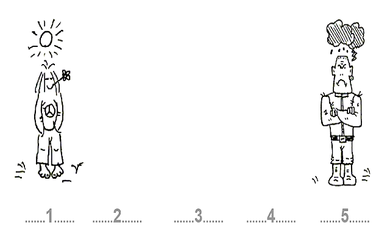
What is more important
Most people agree that feeling good is more important than either money or knowledge outright. If so, where are the lessons, alongside all the other classes we take at school, that teach us how to manage our emotions?
Test
Rate your current mood, using a Likert scale from 1 = excellent to 5 = lousy.
If you scored 1 or 2 … feel free to opt out of this course. The rest of you please stay and read carefully.
These short lessons will teach how to change your reality or your perception of reality - and we’ll do that while you are having fun in the process.
So, let’s start with a basic definition.
Stress is the response of the body to any event that threatens (or is perceived to threaten) our well-being, and exceeds our ability to cope with it (1).
Any event, pleasant or unpleasant, that requires adjustment may cause a range of physiological and psychological responses. Hence, stress is unavoidable, normal, and even necessary. Excessive stress is the problem.
"You can’t stop the birds of worry from flying over your head – but you can keep them from building their nest in your hair." – Martin Luther King
Although we cannot get rid of negative emotions, we can reduce the frequency, intensity, and duration of such emotions. Make sure you memorise these three factors.
Exercise
List 3-5 common sources of stress in your life. Common responses include relationships, work, finances, traffic, health concerns, etc.
The president of the Idiots Club,
Dr Ro
Sources
(1) Lazarus, R. S., & Folkman, S. (1984). Stress, appraisal and coping. New York: Springer.
- How much money we have,
- How much knowledge we have, or
- How we feel?
Most people agree that feeling good is more important than either money or knowledge outright. If so, where are the lessons, alongside all the other classes we take at school, that teach us how to manage our emotions?
Test
Rate your current mood, using a Likert scale from 1 = excellent to 5 = lousy.
If you scored 1 or 2 … feel free to opt out of this course. The rest of you please stay and read carefully.
These short lessons will teach how to change your reality or your perception of reality - and we’ll do that while you are having fun in the process.
So, let’s start with a basic definition.
Stress is the response of the body to any event that threatens (or is perceived to threaten) our well-being, and exceeds our ability to cope with it (1).
Any event, pleasant or unpleasant, that requires adjustment may cause a range of physiological and psychological responses. Hence, stress is unavoidable, normal, and even necessary. Excessive stress is the problem.
"You can’t stop the birds of worry from flying over your head – but you can keep them from building their nest in your hair." – Martin Luther King
Although we cannot get rid of negative emotions, we can reduce the frequency, intensity, and duration of such emotions. Make sure you memorise these three factors.
Exercise
List 3-5 common sources of stress in your life. Common responses include relationships, work, finances, traffic, health concerns, etc.
The president of the Idiots Club,
Dr Ro
Sources
(1) Lazarus, R. S., & Folkman, S. (1984). Stress, appraisal and coping. New York: Springer.
2. Sources and effects of stress
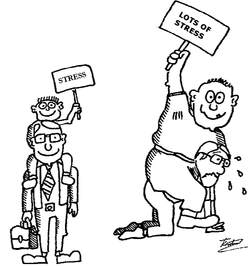
Daily stressors include work, commuting, relationships, finances, noise, etc.
Yet a large part of the stress we experience exists only in the eyes of the beholder. This premise is supported by the fact that humans can trigger the stress or fight or flight response simply by thought, i.e., without a real, objective, external threat.
Nightmares are a helpful example: an imaginary stimulus, can cause psychological and physical responses.
Excessive, frequent, and long lasting stress has been associated with a variety of ailments (1).
Personality
According to Aaron Beck, anxious individuals often have unrealistic fears, tend to overrate the possibility of something bad happening to them, focus on potential negative scenarios, and worry about future events. They also overestimate the significance of an event, underestimate their ability to deal with events, and underrate or misuse social support.
Are these types of thought patterns “nurtured” and acquired or are they the result of biologically determined personality traits that predispose people to think and act in a certain way?
The answer is both.
Certain individuals are genetically privileged and can endure more stress. The personality traits believed to buffer stress include explanatory style, self-efficacy, psychological hardiness, locus of control, sensation seeking, autonomic nervous system responses, and Type-A behaviour.
Can we change?
On the other hand, with some training, people can change their thought patterns and build better coping skills, which is our next subject.
Exercise
We all know people who rarely get stressed and others who get stressed by everything or are constantly stressed. Which category do you belong in? Can you think of certain periods or situations during which you surprised yourself with your responses?
Dr Ro, Idiots are Invincible
Sources
(1) Folkman, S. (2013). Stress: appraisal and coping. In Encyclopaedia of behavioral medicine (pp. 1913–1915). Springer New York.
Yet a large part of the stress we experience exists only in the eyes of the beholder. This premise is supported by the fact that humans can trigger the stress or fight or flight response simply by thought, i.e., without a real, objective, external threat.
Nightmares are a helpful example: an imaginary stimulus, can cause psychological and physical responses.
Excessive, frequent, and long lasting stress has been associated with a variety of ailments (1).
Personality
According to Aaron Beck, anxious individuals often have unrealistic fears, tend to overrate the possibility of something bad happening to them, focus on potential negative scenarios, and worry about future events. They also overestimate the significance of an event, underestimate their ability to deal with events, and underrate or misuse social support.
Are these types of thought patterns “nurtured” and acquired or are they the result of biologically determined personality traits that predispose people to think and act in a certain way?
The answer is both.
Certain individuals are genetically privileged and can endure more stress. The personality traits believed to buffer stress include explanatory style, self-efficacy, psychological hardiness, locus of control, sensation seeking, autonomic nervous system responses, and Type-A behaviour.
Can we change?
On the other hand, with some training, people can change their thought patterns and build better coping skills, which is our next subject.
Exercise
We all know people who rarely get stressed and others who get stressed by everything or are constantly stressed. Which category do you belong in? Can you think of certain periods or situations during which you surprised yourself with your responses?
Dr Ro, Idiots are Invincible
Sources
(1) Folkman, S. (2013). Stress: appraisal and coping. In Encyclopaedia of behavioral medicine (pp. 1913–1915). Springer New York.
3. Coping with stress
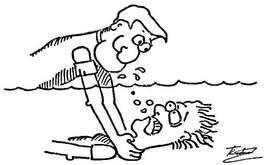
Idiots (UK/GR/BG)Are there adaptive and non-adaptive responses to stress? Can I control my body’s physiology? Can I control my thoughts?
Have you ever thought about what determines how we feel at any given moment?
Antony Robbins simplifies it: two factors - our physiology and our thoughts.
There is no single way to respond to a stressful situation. Two people may respond to the same event in completely different ways.
Some coping responses are healthier and more effective than others. Contrast for example, lighting a cigarette to going for a walk. Coping responses that are the result of conscious thought and planning may be referred to as stress management strategies.
“When it rains, I let it.” 113-year-old man in response to a question about the secret of his longevity.
Exercise
How do you manage your stress? What are your favourite coping responses? What are some healthier options?
Dr Ro, Idiots are Invincible
Have you ever thought about what determines how we feel at any given moment?
Antony Robbins simplifies it: two factors - our physiology and our thoughts.
- Physiology. To illustrate the importance of the first factor, consider how you feel when you have not rested or slept well; when your body lacks glycogen, nutrients, water, or oxygen. The reasonable next question to ask is “Can we control our physiology?” We can, and we do all the time; eating, drinking, deep breathing, moving – as if by miracle – formulate our body’s chemistry and affect the way we feel.
- Thoughts. External events and conditions do influence our thoughts. Optimally, changing a situation resolves the problem and reduces stress. Yet, we do not always have control over the external parameters. Rather than altering external conditions, most cognitive techniques focus on changing one’s emotions by changing the ways we think and respond to events.
There is no single way to respond to a stressful situation. Two people may respond to the same event in completely different ways.
Some coping responses are healthier and more effective than others. Contrast for example, lighting a cigarette to going for a walk. Coping responses that are the result of conscious thought and planning may be referred to as stress management strategies.
“When it rains, I let it.” 113-year-old man in response to a question about the secret of his longevity.
Exercise
How do you manage your stress? What are your favourite coping responses? What are some healthier options?
Dr Ro, Idiots are Invincible
4. The “Ro” method
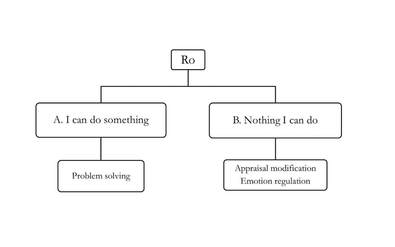
Ancient philosopher Epictetus went on to say
“Of things, some are in our power and others are not.”
Indeed, we cannot always control other people or external events. We can, however, control our thoughts, regulate our emotions, and adjust our behaviour – to a large extent.
Because we have complete control over our thoughts, we can alter the way we perceive external events.
“God grant me the serenity to accept things I cannot change, courage to change things I can, and wisdom to know the difference”
wrote Reinhold Niebuhr.
Simplistic advice you may think. Note the two distinct paths: to accept conditions as they are or to accept the responsibility to change them.
Alas, most of us struggle with the third part of the above motto. Clouded by our emotions, we do not take a step back to examine:
In the next lesson we’ll examine the two options.
Exercise
Pick a problem, e.g., an issue you have been worrying about lately. Use the diagram above or the “Ro” method infographic to examine whether there is something you can do or whether you need to accept the situation.
Dr Ro, Idiots are Invincible
Sources
Rodafinos, A. (2007). Prince to frog and vice versa: Applied psychological techniques to improve yourself – or others (7th edition). Thessaloniki.
“Of things, some are in our power and others are not.”
Indeed, we cannot always control other people or external events. We can, however, control our thoughts, regulate our emotions, and adjust our behaviour – to a large extent.
Because we have complete control over our thoughts, we can alter the way we perceive external events.
“God grant me the serenity to accept things I cannot change, courage to change things I can, and wisdom to know the difference”
wrote Reinhold Niebuhr.
Simplistic advice you may think. Note the two distinct paths: to accept conditions as they are or to accept the responsibility to change them.
Alas, most of us struggle with the third part of the above motto. Clouded by our emotions, we do not take a step back to examine:
- Whether the specific problem is amenable to change
- Its priority compared to other demands
- Possible actions, and importantly
- How much time and energy we are willing to invest to resolve the issue (1).
In the next lesson we’ll examine the two options.
Exercise
Pick a problem, e.g., an issue you have been worrying about lately. Use the diagram above or the “Ro” method infographic to examine whether there is something you can do or whether you need to accept the situation.
Dr Ro, Idiots are Invincible
Sources
Rodafinos, A. (2007). Prince to frog and vice versa: Applied psychological techniques to improve yourself – or others (7th edition). Thessaloniki.
5. Scenario A: I can do something about the problem

Problem solving is a healthy or adaptive coping strategy.
When the conditions are Amenable to change, the issue is Important enough, and we are willing to devote Energy and Time (our two most valuable resources) to resolve it, then we better deal with it.
Basic problem solving steps include:
The next lesson will examine the second case.
We will discuss ways to modify our appraisal of an event we cannot solve and how to manage the related emotions.
Exercise
Think of a problem that you cannot resolve at this stage of your life. Can you change the way you see it? How do you feel about it now?
Dr Ro, Idiots are Invincible
When the conditions are Amenable to change, the issue is Important enough, and we are willing to devote Energy and Time (our two most valuable resources) to resolve it, then we better deal with it.
Basic problem solving steps include:
- Definition of problem
- Evaluation (importance, priority compared to other issues)
- Listing of alternative plans (ask experts, find more about it)
- Ranking of solutions, selection of the best
- Implementation
- Outcome evaluation and feedback.
- problem solved or
- problem not solved.
The next lesson will examine the second case.
We will discuss ways to modify our appraisal of an event we cannot solve and how to manage the related emotions.
Exercise
Think of a problem that you cannot resolve at this stage of your life. Can you change the way you see it? How do you feel about it now?
Dr Ro, Idiots are Invincible
6. Scenario B: Nothing I can do right now

Assume you have exhausted all options and tried everything you could to change the situation. Or, that you have decided that the issue is not worth investing more Effort, Time, and Energy.
In both cases, you need to move on.
Placing things in perspective, ask “how important is the issue for the rest of my life?” If it is very important, then it was worth the effort - and at least we did everything we could.
“Men are disturbed not by the things that happen, but by their opinions about the things.”
To paraphrase Epictetus' concept above, what we think is happening is not necessarily what is happening. There is no stress in any situation, unless … we think there is. Things become as important as we allow them.
Consider the following. We all start our lives with a given amount of energy and time at our disposal. Each time we deal with a problem or a stressful situation, we “withdraw” a certain amount of Time and Energy from our account, to adapt to its demands.
Individuals who easily resort to their “savings” may become bankrupt – physically and emotionally – much sooner than those who respond with caution and without exaggerations.
“Circumstances and situations do colour your life, but you have been given a mind to choose what the colour shall be” - R. Holden
Exercise
Have you been choosing your fights wisely? Because we may well win a few battles but end up losing the war. At the end of the day, spend 15 minutes to review which fights were worthwhile. Also review whether the amount of resources you allocated to each was appropriate.
Dr Ro, Idiots are Invincible
In both cases, you need to move on.
Placing things in perspective, ask “how important is the issue for the rest of my life?” If it is very important, then it was worth the effort - and at least we did everything we could.
“Men are disturbed not by the things that happen, but by their opinions about the things.”
To paraphrase Epictetus' concept above, what we think is happening is not necessarily what is happening. There is no stress in any situation, unless … we think there is. Things become as important as we allow them.
Consider the following. We all start our lives with a given amount of energy and time at our disposal. Each time we deal with a problem or a stressful situation, we “withdraw” a certain amount of Time and Energy from our account, to adapt to its demands.
Individuals who easily resort to their “savings” may become bankrupt – physically and emotionally – much sooner than those who respond with caution and without exaggerations.
“Circumstances and situations do colour your life, but you have been given a mind to choose what the colour shall be” - R. Holden
Exercise
Have you been choosing your fights wisely? Because we may well win a few battles but end up losing the war. At the end of the day, spend 15 minutes to review which fights were worthwhile. Also review whether the amount of resources you allocated to each was appropriate.
Dr Ro, Idiots are Invincible
7. “Ro” method template
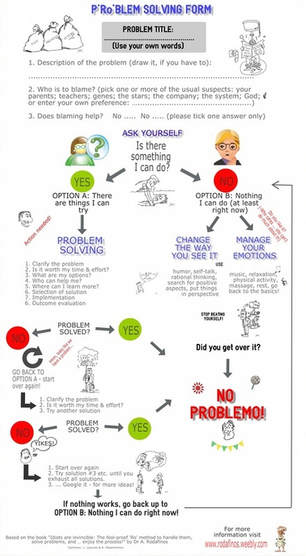
The P“Ro”blem-solving form below can guide you with a specific issue that concerns you, in organising your thoughts, and examining whether the specific problem is worth your time and energy.
1. Problem title:
.................................
2. Description:
.................................
3. Who is to blame (e.g., parents, teachers, the system, the stars):
.................................
4. Does blaming help? (Please select one answer only):
No … No …
5. Can I do something to change the situation?
Option A. I can do something about it.
1. What can I do? (Brainstorming, evaluation of ideas)
.................................
2. What more can I learn about the issue?
.................................
3. Who can help?
.................................
4. Is it worth my time and energy?
Option Β. Nothing I can do about the problem (at this stage).
1. Accept the fact that we cannot always control others or external conditions.
2. Change the way we see the problem, our responses, or both.
Exercise
As you can see, solving problems is a logical process. The Ro method describes simple steps for dealing with any type of problem. It is guaranteed to solve your number one problem. Oh, and your number 2, 3, 4, ... Print and use the form today.
Dr Ro, Idiots are Invincible
Sources
For more information, the related form, and practical examples read chapter 8 in Idiots are Invincible
1. Problem title:
.................................
2. Description:
.................................
3. Who is to blame (e.g., parents, teachers, the system, the stars):
.................................
4. Does blaming help? (Please select one answer only):
No … No …
5. Can I do something to change the situation?
- Yes, go to Option A below.
- No. Skip A, and go to Option B.
Option A. I can do something about it.
1. What can I do? (Brainstorming, evaluation of ideas)
.................................
2. What more can I learn about the issue?
.................................
3. Who can help?
.................................
4. Is it worth my time and energy?
- No. Go to Option Β below.
- Yes. Keep thinking. E.g., how much time and energy am I willing to invest?
Option Β. Nothing I can do about the problem (at this stage).
1. Accept the fact that we cannot always control others or external conditions.
2. Change the way we see the problem, our responses, or both.
Exercise
As you can see, solving problems is a logical process. The Ro method describes simple steps for dealing with any type of problem. It is guaranteed to solve your number one problem. Oh, and your number 2, 3, 4, ... Print and use the form today.
Dr Ro, Idiots are Invincible
Sources
For more information, the related form, and practical examples read chapter 8 in Idiots are Invincible
Summary of Part 1
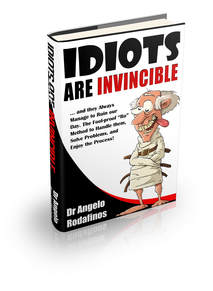
Stress can be useful or harmful. A certain degree of stress is necessary - it provides variety and alertness. Excessive stress is the problem. We need to learn how to regulate our level of stress.
All individuals face challenging situations and serious issues. Our perception, interpretation and responses make the difference and determine how successfully we cope.
A number of techniques can help improve our coping skills and enhance our ability to effectively deal with excessive stress.
According to the Ro method, we have two options when presented with a problem:
Pop quiz
What are the two factors that affect how we feel? List a few methods that you can use any given time to change your emotions.
Exercise
To practice using the Ro method, pick two of the following scenarios: flight delay, failure to meet an important goal, financial problems, relationship issues, diseases, death of significant other. Discuss healthy and adaptive responses with your partner, a friend or a colleague. When you feel you are ready, see if you can help a friend or family member deal with one of their problems.
Dr Ro, Idiots are Invincible
All individuals face challenging situations and serious issues. Our perception, interpretation and responses make the difference and determine how successfully we cope.
A number of techniques can help improve our coping skills and enhance our ability to effectively deal with excessive stress.
According to the Ro method, we have two options when presented with a problem:
- If there is something we can do about the stressor, we need to engage in problem solving, provided we care enough, and are willing to invest time and energy. If we do not wish to waste our valuable resources – time and energy – on resolving a problem that is not that important or that is not amenable to change, we are better off focusing on things that are under our control, such as what is going on inside us.
- If there is not much we can do about the stressor, then we need to change the way we view the problem and/or deal with our emotions.
Pop quiz
What are the two factors that affect how we feel? List a few methods that you can use any given time to change your emotions.
Exercise
To practice using the Ro method, pick two of the following scenarios: flight delay, failure to meet an important goal, financial problems, relationship issues, diseases, death of significant other. Discuss healthy and adaptive responses with your partner, a friend or a colleague. When you feel you are ready, see if you can help a friend or family member deal with one of their problems.
Dr Ro, Idiots are Invincible

